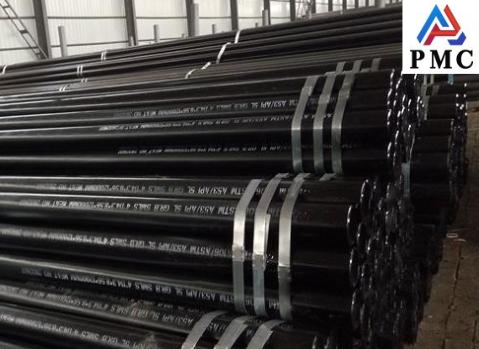
Seamless Pipe VS MS Pipe
When selecting the right steel pipe for industrial or construction applications, it's important to understand the differences between Seamless Pipes and MS (Mild Steel) Pipes. Both are widely used, but each serves distinct purposes based on its properties, manufacturing method, and performance.
What is a seamless pipe?
A seamless pipe (SMLS pipe) is a type of steel pipe made without any welds. It is produced by piercing a solid steel billet and forming it into a hollow tube through rolling. This process results in a pipe with a smooth surface, consistent structure, and excellent mechanical strength. Seamless pipes offer superior pressure and temperature resistance, making them ideal for demanding applications like oil and gas transmission, power generation, and high-pressure boilers.
What is an MS pipe?
MS Pipe, short for Mild Steel Pipe, is made from low carbon steel and typically manufactured through welding processes like ERW (Electric Resistance Welding). MS pipes are commonly used in general structural applications, water supply, fencing, and low-pressure pipelines. They are affordable, easy to fabricate, and widely available.
Manufacturing process: seamless pipe vs MS pipe
1. Seamless pipe manufacturing process
Raw Material: Solid round billet (usually carbon or alloy steel)
Heating: The billet is heated to a high temperature.
Piercing: A mandrel is used to pierce the heated billet to form a hollow shell.
Rolling: The hollow shell is elongated and rolled into the desired diameter and wall thickness using rotary or stretch-reducing mills.
Sizing & Finishing: Pipes are cut to length, heat-treated (if required), straightened, and inspected.
Key Feature: No weld seam, uniform structure, high strength.
2. MS Pipe Manufacturing Process
Raw Material: Mild steel strips or coils (low carbon content)
Forming: The steel strip is uncoiled and shaped into a circular section through rollers.
Welding: The edges are welded together using methods like ERW (Electric Resistance Welding) to form a pipe.
Sizing & Finishing: The welded pipe is cut, straightened, surface-treated, and tested.
Key Feature: Contains a weld seam, economical, easy to fabricate.

Mechanical properties: seamless pipe vs MS pipe
Seamless pipe: Good overall uniformity, higher tensile strength and yield strength, and excellent impact resistance (especially under high temperature and high pressure). There are no joint weaknesses, it can withstand higher internal and external pressures and is suitable for high-pressure environments. The outer diameter and wall thickness tolerances are smaller, the surface finish is high, and it is suitable for precision equipment.
MS pipe: Due to the existence of welding seams, the local strength may be slightly lower, and the toughness is greatly affected by the quality of the welds (high-quality welded pipes can be close to seamless pipes). The pressure resistance is low, the joints are potential weak points, and it is not suitable for ultra-high pressure conditions. The dimensional tolerance is relatively large and the surface accuracy is low.
Materials and corrosion resistance: seamless pipe vs MS pipe
Seamless pipe: It can be made of low carbon steel and alloy steel (such as stainless steel, alloy structural steel, etc.), with a wide range of applicable materials, and can meet the requirements of different media (such as corrosive fluids, high temperature gases).
MS pipe: The main material is low-carbon steel (carbon content ≤ 0.25%), which has poor corrosion resistance (easy to rust), and usually needs to be galvanized to improve its rust resistance (i.e. Galvanized MS Pipe).
Application: seamless pipe vs MS pipe
Seamless Pipes are widely used in:
Oil and gas pipelines
High-pressure steam lines
Power plant systems
Chemical and petrochemical industries
MS Pipes are commonly used for:
Construction scaffolding and fencing
Water and drainage lines
Firefighting systems
Automotive and light industrial uses
Read more: MS Seamless Pipe, Mild Steel Seamless Pipe Manufacturer & Exporter
- 【Prev】 : Casing Pipe Size
- 【Next】 : MS Seamless Pipe Standard Sizes


